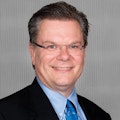Advance SPD to include higher-paid specialist teams
Amid the developing and growing debate about the adoption and implementation of disposable/single-use endoscopes – and just how pervasive the transformation needs to be, Gregg Agoston believes he has a more fundamental solution that must be implemented first.
“The bottom line is that the 1940s model for SPD does not work in today’s advanced surgery environment,” Agoston argued. “The model for SPD must be upgraded to allow for highly trained specialists to reprocess complex instruments. Nurses and surgeons specialize in one or two service lines, [but] SPD must be the master of all. Is this a realistic expectation without some form of specialization? Consider orthopedic instruments used for arthroplasty. The majority of these of these instruments are complex. These instruments can be processed effectively primarily because the manufacturer of the instruments/implants provides their representatives who inspect and assemble the instruments prior to the SPD staff wrapping and sterilizing them. If the representatives were not providing these services, there would be tenfold times the errors.
“This model of having a highly trained technician (vendor rep) perform the critical functions in conjunction with less skilled staff who clean and sterilize the set, works,” he continued. “Companies such as ours offer Specialists for Minimally Invasive Surgery, Orthopedics and flexible endoscopes. Specialization works because of the laser focus of the Specialist on the assigned complex instruments. Removing the responsibility for complex instruments makes it easier for the hospital to hire and train technicians for the non-complex instruments, effectively making them non-complex instrument specialists.”
Agoston scoffs at hospital claims that it cannot afford specialization in SPD.
“They do not realize that they are paying a lot more to staff the department than they realize,” he indicated. “The costs associated with high staff turnover, training, errors, delays, disposable instruments, repairs/replacements, surgeon and staff frustration and the potential for [surgical site infections] all need to be calculated. Single-use or limited-use flexible endoscopes (disposables) will not solve the intrinsic problem of non-qualified technicians reprocessing complex instruments. Complex instruments require a higher level of skills for the technician to be successful.”
Agoston swipes at the compensation levels offered to SPD management and staff as not reflecting the complexities and intensities of the job.
“Most SPDs experience high levels of turnover (20 percent-plus) due to low pay and the demanding work,” he observed. “Typical starting pay for a non-certified SPD technician is around $12 per hour. Most technicians max out at around $22 per hour. We find that most SPD departments average between 30 percent to 50 percent of their staff having less than one year of experience. This revolving door for staff and management exacerbates the issues. The symptoms of a poor preforming SPD are OR delays, missing/broken/contaminated instruments, demand for single use instruments, high replacement/repair costs, surgeon/nursing frustration, high turnover/vacant positions/agency staffing, etc. These symptoms result in real cost to the hospital.”
- Outlook Endoscopy: What’s next for endoscope reprocessing and device design?
- Looking ahead at endoscope reprocessing quality performance
- Techniques and tips for aeration, drying and storage
- Why ergonomics should not be over- looked
- Advance SPD to include higher-paid specialist teams
- The true colors of hydrogen peroxide sterilization chemical indicator strips
- Periscope: Color-coded standard needed for hydrogen peroxide sterilization indicator strips
- Endoscope Care in 2020 and beyond
About the Author
Rick Dana Barlow
Senior Editor
Rick Dana Barlow is Senior Editor for Healthcare Purchasing News, an Endeavor Business Media publication. He can be reached at [email protected].


